#so instead of being overly consumed by The Sadness today i've decided
Text
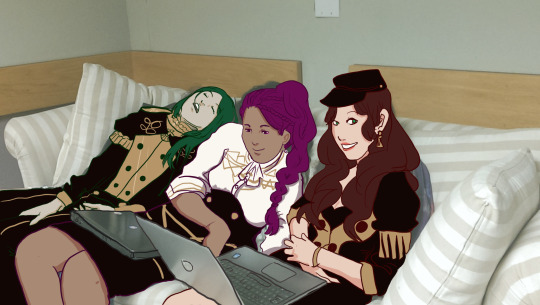
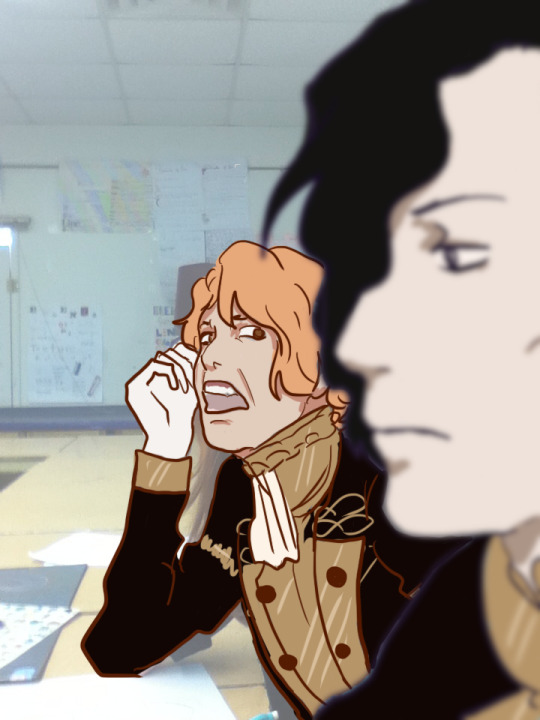
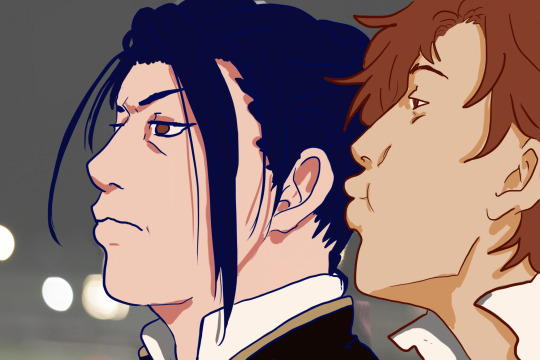
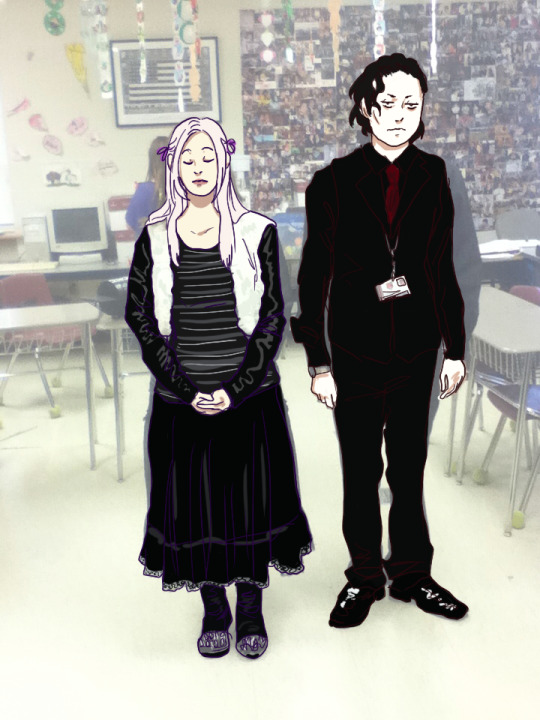

So like, what else would you do with multitudes of weird photos from high school?
#doodles#fire emblem#fe3h#linhardt von hevring#petra macneary#dorothea arnault#ferdinand von aegir#hubert von vestra#felix hugo fraldarius#sylvain jose gautier#edelgard von hresvelg#fe art tag#my art#again look at that starting to use full names in case that's more convenient#so instead of being overly consumed by The Sadness today i've decided#to instead work on some nonsense to keep myself busy#and avoid feeling overwhelmed#and this is what resulted#i took so many pictures of everyone when i was in high school!#none are very good quality bc i mostly took them with the ipod touch i had at the time#i've always liked to just. document things#and so i would document the various things my friends did#i have a lot more i wanna draw over and i may work on that in the next day or two#then again i do have an essay i need to be working on#but will i have the focus?#who knows!#ok anyway here u go take whatever this is
1K notes
·
View notes
Note
Hello there! Thank you for taking the time to read this. I've long been an admirer of your work. I was wondering if you had any advice on writing? Especially for someone just new to writing? Or, like, in regards to outlining stories?
Why can’t I give hugs through the internet why. Thank you so much for such sweet words and I apologize for the wait. I spent the past couple of days concocting some writing advice for you and it turned into a thing. Hope it’s worth the wait!
I want to preface this: below is my writing process. It works for me. It may not work for all writers and I highly encourage others to figure out what does work for them. It took me several years to come to this conclusion, so don’t be discouraged if everything doesn’t click for you. Writing takes time to develop and we all learn and create differently. Try things out and see if it’s beneficial.
Also, while I know you asked specifically for writing and outlining tips for beginners, I am including editing tips. A lot of people might view writing and editing in a different light, but I believe that they go hand-in-hand; getting used to editing will help you become a better writer and vice versa. I know countless people who bang out stories and then let the drafts collect dust, because editing is daunting.
Lastly, a massive shout-out to my partner-in-crime, beta reader, and braintwin—Amie @wingsyouburn . She helped contribute to and refine this and is also a brilliant writer and has helped me become the writer I am today. Endless thanks to you, bb!
On that note, let’s jump right into this.
OUTLINING
I can’t write without some vague idea of where I’m going. It’s like having a map with you on a road trip; you might deviate from your route along the way due to pit stops or traffic or simply wanting to go the scenic route, but you at least know where your end goal is. And it can vary depending on what you’re writing. If I have a oneshot idea, maybe I jot down a sentence or two about the plot, usually with a “problem” and then a “conclusion”. For example: Character A is doubting herself and decides to vent to Character B, who offers comfort and kisses. Sometimes I jot these down if I have an idea hits me at work or in line at a café. You can always refer back to it later on. Filling in the blanks of said outline is where the fun of writing comes in!
Even for my drabbles, I will write very brief sentences of what I imagine would happen. It helps me stay concise and stick to that main point instead of meandering.
For longer pieces, I try to write out each scene I want to include. Some people I know do this by writing on notecards. I used to make a bullet list, but now I use Scrivener to map outlines. With a bullet list, you can do it like this:
Scene 1
Scene 2
Scene 3
Scene 4
It doesn’t need to be extremely thorough. Just get those ideas out of your head and onto paper. You can always go back and switch up the order later and if you don’t entirely know what would happen in a scene, but for example, you know the end result? You can easily write something like, “a bunch of shit hits the fan and then the gang run off into the sunset.” Maybe when you start writing, you’ll have a better idea of what shit hitting the fan includes. And when you do figure it out, go back to your outline and make a bullet under that particular scene with the details. I’ve done this plenty of times. Hell, I have an outline for a 200k story I did where the last 1/3 of the outline just never happened in my draft. A better idea came along and I went with that. And that’s ok!
Your outline is there to help you and not hurt you. It’s flexible and bare minimum, when you’re done with a story, you can look back on it and see how much you’ve evolved since your initial idea.
WRITING
Consume art. Read. Read some more. Keep reading. Watch a movie. Go to a museum. Take a walk at the park. Listen to music. So many things inspire people and the tiniest instances can spark an idea for a story. Always be open to them. Figure out what you love and what you don’t. Consume both of those. Inspiration can come even from genres we don’t particularly like. Don’t be afraid of something new. When I was in art school, we were required to take non-major studio classes. I ended up in a weaving class, filled with other textile students when all I ever knew was graphic design. I learned a tremendous amount in that semester to carry over into my graphic design work and I’m sure my peers learned a lot from me, too. That concept carries over into so many creative fields. Embrace that.
Also, if you’re the type that benefits from reading books about writing, here are some A+ resources:
On Writing by Stephen King
Bird by Bird by Anne Lamott
Writing Down the Bones by Natalie Goldberg
No Plot? No Problem! by Chris Baty
The Artist’s Way by Julia Cameron
Zen in the Art of Writing by Ray Bradbury
Take care of yourself first. This tip simultaneously has nothing and everything to do with writing. For me, I have a handful of health issues. I work a full-time job. I have a ton of other hobbies that eat up my time. Before I write, I need to make sure I’m doing well before I even bother to sit in front of my laptop. I can’t be overly stressed out or in pain or distracted. Sometimes you need to calm down and relax and not write. I can’t focus otherwise and the few times I did write when I clearly shouldn’t have? It was evident in my writing and thus triple the amount of editing work. I know it’s stressful not being able to write. Trust me… I’ve been there numerous times. But I believe that in the long run, you’ll be happier with yourself and your writing if you learn to treat yourself with respect and not beat yourself up when you’re unable to write every waking minute.
Set times to write and then do it. Some people might have inspiration strike them and that’s the only time they write. Yes, that can be helpful, but there’s also something to be said about developing a schedule and sticking to it, even if you’re not motivated. So you’ve done everything mentioned above: your tummy’s full, no one is around to bother you, you got a delicious cup of something beside you, it’s your favorite weather outside, and you’re in your favorite chair. But you’re staring at your monitor and just… uuuuuugh you don’t feel motivated. You know what? Fuck it. Just write. Write something. Anything. 75% of my writing was done out of the sheer willpower. Write! Even if it’s a page, so what?! That’s a page more than what you initially started out with! Squeezing in some scribbles on your lunch break every day can add up by the end of the week. Those 30 minute sessions are suddenly 2 ½ hours!
Again during my art school days, I would be up until 4am trying to do 40 posters in time for the morning’s critique and I’d be on those last 3 poster designs and I was tired with no inspiration and ran out of fucks at 11pm, but I pushed through. You know what? My teachers and peers alike loved those 3 designs I did at fuck-this-shit o’clock. I’m serious. Every single time.
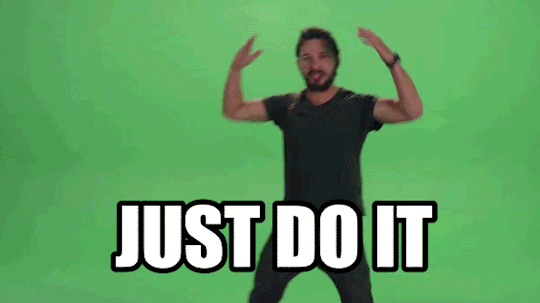
Start writing and never look back. This is your time to write. Not to edit, not to try and craft the perfect sentence Of All Time. You’re writing. You are word vomiting whatever nonsense is in your head. It’s a first draft. It’s going to be messy. It’s probably going to be shit. Who the hell cares? That doesn’t mean you or your writing is shit. Everybody, even the most seasoned writer, doesn’t write a perfect first draft and you can’t fix what isn’t written. So write, write, write! Smack your inner editor each time it tells you to go back and edit a paragraph. Disable your wifi if you think you’ll get distracted. For me, I put on some quiet, ambient music to drown out the world and go into Scrivener’s full-screen mode. I highly recommend checking libraries in your area if you want some quiet time. The librarians are also way more than happy to show you where designated quiet/study areas are if you’re not sure.
Write what YOU want to write about. Don’t write something just because it’s popular and that’s what everyone else is doing. Do it for yourself first and foremost. It doesn’t need to be for everyone, but let it be for you. It will show tremendously in your writing if you’re excited about a thing. Likewise, it’s beyond evident if you’re bored with a scene in your story. Write about what excites you and I promise your writing will display that excitement. On the same note, if you’re stuck on a scene and just don’t know what to do with it, move along. Maybe that scene isn’t needed. Skip to the next, more interesting thing. Write the story you want to read.
Incorporate your experiences. The expression “write what you know” gets tossed around with the assumption that people will go, “Ooooooh, yeah that makes sense.” Think on all your life experiences and draw upon them. You may not be the commanding officer of a prestigious military, but maybe you’ve been in a group project in school where someone needed to step up as leader in order to get shit done in time for the oral presentation. Remember your emotions during times of struggle, elation, anger, and sadness. Channel it into your writing.
Write in chronological order. Some people have mastered the art of writing that one middle scene they’re super stoked about or writing random scenes out of time and then stitching it together later. I am not one of those people. For a beginner, it might be less daunting to write everything in chronological order. That way you can build up things like character development/growth and tension and so forth in a natural way via passing time. If you start writing a scene where the main pairing finally kiss, but don’t write the ten chapters leading up to that, it’s a lot more difficult to flesh out all that tension in one scene when you hadn’t written it yet. I’m also of the opinion that it’s better to write all the things before that One Scene you’re giddy about; it can speed up the writing process because you want to arrive at that One Scene, so hey, anything to motivate you, ya know?
EDITING
After I wrote my first novel draft after years of not writing, I had this massive feeling of, “…shit, now what?” For every single guide to editing, there’s a hundred more for writing. Editing is an extremely personal process. It took me over two years before I became comfortable with editing my own work. Let’s be honest – it’s terrifying. And I wish there was a more concise guide about it when I first started, so hopefully this helps.
I edit in rounds. My first round involves just reading, no editing. I keep a journal to take notes, mostly plot, characterization, redundancies, and cuts/additions I’d want to make. My second round combs through it to fix those bigger problems along with any glaring grammar/spelling errors and mild line edits. I will send it to a beta to read after that for additional commentary/suggestions. My third round addresses all of that on top of hardcore line edits—I want every damn sentence to be the best version of that sentence ever. One more time it goes back to the beta to nitpick the hell out of it. And my last round is spent reading what I wrote out loud. If my tongue trips over anything, I change it. Apply some spit and polish, give it some lunch and a backpack, and then off to AO3 it goes to make some new friends.
Maybe you edit in less or more rounds. Maybe you have more rounds of sending content to beta readers. Maybe you need to rewrite the whole thing three times before it ever sees a beta reader. Do what feels good to you. Only you will be able to figure it out and you won’t know until you try. I promise once you get your feet wet and test it out, you’ll feel more confident about your writing over time.
Here are some more specific tips that no one ever bothered to tell me until after the fact. These might be overwhelming for a beginner, so don’t feel the need to master these immediately. Take it one step at a time and try them when you are comfortable doing so.
Walk away from it. After finishing a first draft, let it sit. Go do something else and forget about your draft. For oneshots, I’ll go back to it after a week. For longer pieces, anywhere between 2-4 weeks. Returning to a draft with rested eyes and a fresh mind will only benefit you in the editing process. You’re still two inches away from your work when you finish the first draft. Walk away from it, come back, and then you can see more, whether it be the strong points or the holes.
Describe what is happening, not how something looks/sounds/feels. I’m sure you’ve heard of “show, don’t tell.” First off, fuck that noise when writing the first draft. Tell to your heart’s content if it means getting it on the damn page. Second off, sometimes telling can be helpful. That’s up to you to decide if it’s beneficial or harmful to your story. I typically go about “show, don’t tell” in the editing phase. Now most people will give this advice and not further explain. So here’s an example:
She was mad at him for once again not doing the dishes.
That’s not a terrible sentence. Though it to make it pack more oomph, take a step back and think. When you’re mad, what do you do? Are you clenching your jaw? Are you grumbling to yourself? Is a headache forming? And when you imagine dishes not done, what does that look like to you? Is it flies swarming around a sink? Is it overflowing from the sink? Is the sponge sitting in five day old water and reeking of mold? Is there a broken dish on the floor because a cat decided to knock it off from the stack of twenty uncleaned dishes? With that in mind, the sentence can possibly be rewritten like this:
Countless plates and silverware wobbled on one another, each encrusted with a previous night’s dinner. She drew a breath, balled up her fists, and glared at him. “Really? I gave you one job.”
Find your descriptions that are comprised of the character feeling or seeing or hearing something and reword them. Breathe life into your words. Make them paintings. I know, it’s not easy. It might even break your brain a little (mine did when I first gave this a serious go), but it will make you think differently and your writing can only grow from that.
Rephrase weaker words. I once had this assignment back in high school where we were given a hundred sentences, each one with “get” in the mix, and we had to rewrite all of them with a unique word replacing “get”. Find words like “get” and forms of “to be” and replace them with stronger words. Something like he got out of bed can turn into he rose out of bed or he jumped out of bed or he slumped out of bed. It rids the sentence of something weak and is more descriptive of what’s going on.
Another thing to look out for are verbs ending in “-ing”. She started walking over or she was walking on over aren’t as direct as she walked over. Trimming out instances like this help make the action more immediate instead of feeling like it’s going or starting or beginning to happen. Just let it happen!
Adverbs are another instance that people will suggest to cut out. They’re at least easy to find (most end in –ly) and when you do spot them, ask yourself this: is there a better word to sum up what I’m trying to express? Something like she said quietly can be she whispered or she murmured or she mumbled. Or something like they ran quickly can be they rushed or they sprinted or they booked it. These all can help get a better idea of what is going on. Plus it can help strengthen your vocabulary by searching for more ideal words!
If your vocab is shaky or you just can’t pinpoint something better, here’s a resource I use all the time. Just remember: always double check the definition of the word to make sure it fits instead of spinning the thesaurus wheel and picking at random.
Lastly, don’t feel the need to go on a witch hunt to purge your story of all of these things. Sometimes it’s best to keep that use of “to be” or that adverb, because there isn’t something better to convey what you’re describing or it distorts the flow of the narrative. And that’s completely okay. It takes time to figure this out.
Cut out redundancies. I tend to overwrite in my first drafts. Editing is where I bust out my figurative chainsaw and kill the extra nonsense. Is there a phrase you keep using over and over? Kill it. Is there a section you read that just bores you to tears? Kill it. Is there a sentence that is proceeded by a paragraph that rephrases that exact sentiment four times? Kill it. Is the process of something we as human beings understand, like opening a door, a three-sentence-long affair? Kill it.
I love poetics in stories and sometimes it can get out of hand. The more concise you are in your delivery, the clearer of a picture you will paint for the readers and the smoother the overall pacing will be.
Never delete. So with all of that in mind, please, for the love of tea and chocolate, never ever delete your work. Doesn’t matter if it’s a conversion from a first to second draft or if you end up hating it, don’t delete it. You never know if you’ll return to it five years down the road or you need to refer back to something from your initial draft when you’re on your third wave of revisions. I keep a folder dedicated to all of my writing on my laptop, which is also backed up to Dropbox. In Scrivener, you can take snapshots of your work for each new draft you start and can always revert back to older snapshots. There’s also an actual editing mode in it, but I believe it’s exclusive to Mac OS. Or if you’re using something simple like Word or Google Docs, make new documents and title them based off of your drafts. Another thing to consider is making a document strictly for lines you love but weren’t able to include in the final version. Don’t get rid of them – keep them. Maybe you revisit it and find a new story for it to fit in or perhaps that lovely line of yours sparks a new story to write. You won’t know if you delete your work.
CLOSING THOUGHTS
Make writer friends. Writing is a solitary activity (well, not unless a pet decides to keep you company, but anyways). Having friends who are also writers or even enthusiastic about writing are a blessing. Bounce ideas off of them or vent to them when you hit a brick wall. Maybe said friends will turn into beta readers when you wish to cross that road. My recent writer friends are people I chatted with on comments with fics, either my own works or their stories. You don’t need to be friends with an entire fandom; find those you resonate with. I’m sure they’ll love gushing about things as much as you do.
And if you ever converse with someone who acts above you and everyone else in regards to writing? Fuck ‘em. They are not and never will be worth your time or anyone else’s.
Keep writing. Like any form of art, writing’s a craft and it will only improve the more you devote time to it. There’s always room for growth. Be humble. Accept change. Allow yourself to learn. I guarantee you that your writing will change for the better in the span of a year if you keep at it. Don’t worry about it being perfect or if it’s telling the “same story” someone else has written—you haven’t written your version of it. You haven’t added your personal touches and experiences and insights to it. Think of how many times Romeo and Juliet has been done in storytelling. People eat it up. To use the cake analogy, you might feel like you’re bringing another cake to the party when there’s already one, but others look at it and go, “FUCK YEAH TWO CAKES!” Lastly, I’ll leave you with a quote from the eternally badass Carrie Fisher, “Stay afraid, but do it anyway. What’s important is the action. You don’t have to wait to be confident. Just do it and eventually the confidence will follow.”
You got this, anon. I believe in you.
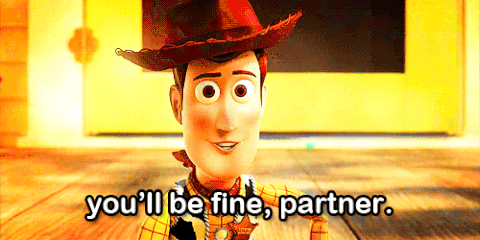
#writing tips#writing advice#writing resources#writing help#writers on tumblr#YOU CAN DO IT ANON#I BELIEVE IN YOU#*FOREVER FLAILING POMPOMS*#long post#Anonymous#my writing
44 notes
·
View notes